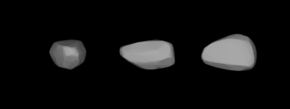352 Gisela
 A three-dimensional model of 352 Gisela based on its light curve. | |
| Discovery | |
|---|---|
| Discovered by | Max Wolf |
| Discovery date | 12 January 1893 |
| Designations | |
| (352) Gisela | |
| Pronunciation | German: [ˈɡiːzəlaː][1] |
| 1893 B; A895 XA; 1950 XT | |
| Main belt (Flora family) | |
| Orbital characteristics [2] | |
| Epoch 31 July 2016 (JD 2457600.5) | |
| Uncertainty parameter 0 | |
| Observation arc | 117.47 yr (42905 d) |
| Aphelion | 2.52149 AU (377.210 Gm) |
| Perihelion | 1.86634 AU (279.200 Gm) |
| 2.19392 AU (328.206 Gm) | |
| Eccentricity | 0.14931 |
| 3.250 yr (1,186.9 d) 3.25 yr (1186.9 d) | |
| 74.6135° | |
| 0° 18m 11.88s / day | |
| Inclination | 3.38092° |
| 247.353° | |
| 144.194° | |
| Physical characteristics | |
| Dimensions | 20.27±2.9 km |
Mean density | ~2.7 g/cm3[3] |
| 7.4796 ± 0.0002 h (0.3116500 ± 8.3×10−6 d)[4] | |
| 0.4261±0.153 [2] | |
| S [2] | |
| 10.01,[2] 10.22 [5] | |
352 Gisela is an asteroid belonging to the Flora family[4] in the Main Belt that has an unusually high albedo. It was discovered by German astronomer Max Wolf on 12 January 1893 in Heidelberg, and named after his wife.[6] This minor planet is orbiting the Sun at a distance of 2.19 AU with a period of 3.250 yr and an orbital eccentricity of 0.149. The orbital plane is inclined at an angle of 3.38° to the plane of the ecliptic.[2]
Photometric measurements of 352 Gisela during December 1999 were used to produce a light curve showing a sinodic rotation period of 7.49±0.01 h with a brightness variation of 0.32 in magnitude.[7] This period estimate was refined to 7.4796±0.0002 h in 2012.[4]
References
[edit]- ^ (German Names)
- ^ a b c d e Yeomans, Donald K., "352 Gisela", JPL Small-Body Database Browser, NASA Jet Propulsion Laboratory, retrieved 11 May 2016.
- ^ Krasinsky, G. A.; Pitjeva, E. V.; Vasilyev, M. V.; Yagudina, E. I. (2002), "Hidden Mass in the Asteroid Belt", Icarus, 158 (1): 98–105, Bibcode:2002Icar..158...98K, doi:10.1006/icar.2002.6837.
- ^ a b c Kryszczynska, A.; et al. (October 2012), "Do Slivan states exist in the Flora family?. I. Photometric survey of the Flora region", Astronomy & Astrophysics, 546: 51, Bibcode:2012A&A...546A..72K, doi:10.1051/0004-6361/201219199, A72.
- ^ Warner, Brian D. (December 2007), "Initial Results of a Dedicated H-G Project", The Minor Planet Bulletin, 34 (4): 113–119, Bibcode:2007MPBu...34..113W.
- ^ Schmadel, Lutz D. (2013), Dictionary of Minor Planet Names, Springer Berlin Heidelberg, p. 66, ISBN 9783662028049.
- ^ Lazar, S.; et al. (June 2001), "Lightcurves and Rotation Periods for Minor Planets (305) Gordonia (307) Nike, (337) Devosa, and (352) Gisela", The Minor Planet Bulletin, 28: 32–34, Bibcode:2001MPBu...28...32L.
{{citation}}: CS1 maint: multiple names: authors list (link)
External links
[edit]- 352 Gisela at AstDyS-2, Asteroids—Dynamic Site
- 352 Gisela at the JPL Small-Body Database


 French
French Deutsch
Deutsch